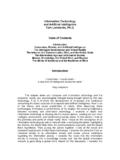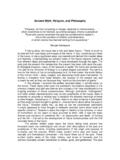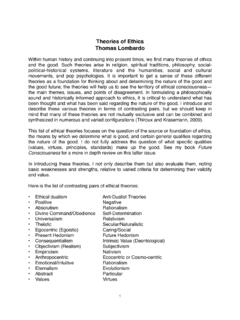Transcription of Plato’s Republic: Just Society or Totalitarian State
1 plato 's republic : just Society or Totalitarian State ? In the republic plato lays out his analogy between the city and the individual soul and identifies personal happiness with public justice. With reason as the highest value, and the philosopher king as the embodiment of reason in the city, plato proposes a political State that, despite its ostensible argument for justice and the good, has been criticized as anti-democratic, anti-humanitarian, anti-individualistic, and in short, Totalitarian . What is it in plato 's argument that evokes such hostile criticism?
2 Is plato 's vision for a good Society incompatible with real justice itself? Does plato arbitrarily define the word justice to suit his own political aims? Can we claim, at the very least, as Stanley Rosen does in plato 's republic : A Study that, whereas the principles themselves are defensible, the attempt to realize them in actual political associations leads to the replacement of philosophy by ideology? In this essay I will attempt to answer these questions by exploring plato 's key concepts of justice, the good, and reason in the context of the few institutions he describes, that of education, leadership, and to a lesser extent family and labor.
3 And I will conclude with a reflection on whether or not the set of arguments Socrates (and thus plato ) employs in the republic is simply a dramatic portrait of people conversing about the connection between justice and the good in the construction of the ostensibly just city, as Rosen asserts (2), or if indeed, as Popper contends, it constitutes a political manifesto for class rule and tyranny. In Book I plato lays open the issue of justice by asking Thrasymachus what the nature and quality of justice is and how it can be compared to that of injustice (1.)
4 351a). By approaching the topic of justice from its opposite, injustice, which he equates with dissension, quarrels and factions, plato immediately sets up his connection between justice and unity and lays the ground for his analogy between the individual soul and the city. If it is injustice which has the power to set any group of people in the city at variance and make them enemies to each other (I. 351e), as well as to cause an individual to have a divided mind and be incapable of action, indeed, to be at enmity with all who are just as well as with himself (I.
5 352a), then plato deduces that justice must be the opposite of such a divisive force. Justice must be unity, harmony, complete agreement among the parts, whether of the city or of the individual soul. Having grounded his concept of justice in unity, plato proceeds to prescribe the element which will ensure that unity and, by extension, justice. For plato , the crucial thing is the recognition of a person's or a thing's function. Explaining that a thing's function is the work that it alone can do, or can do better than anyone else (I.
6 353a) plato is able to apply the concept not only to the individual in the city but also to the various parts of the soul, thereby allowing him to develop his analogy in Book II and more extensively in Book IV. plato devotes the opening of Book II to a discussion of the origin of the State and does so to show how his concept of justice is necessary. The State , plato explains, comes into existence because no individual is self-sufficing but rather a member of one of the various classes which supplies needs to one another (II.
7 369b). As a member of a specific class, each individual possesses a specific function for which he is naturally fitted and, according to plato , he would do good work if he confined himself to that all his life (II. 374c). In Book IV, plato drives home this theory of justice and insists upon adherence to what Nicholas White, in A Companion to plato 's republic , calls the Principle of Natural Division (17). For plato there are only three classes of people in the city, the golden Rulers, the silver Guardians or Auxiliaries, and the bronze or iron tradesmen, or as Rosen categorizes them, the philosopher/ruler, the soldier, and the money-making partisan/worker (396).
8 Justice relies on each class performing its proper function. So rigid is plato about this principle that he goes so far as to say that where there are . three orders, any plurality of functions or shifting from one order to another is .. utterly harmful and the extreme of wrongdoing (IV. 434c). Whereas plato does mention three orders, what he really is interested in is the upper class composed of the Guardians and the Rulers, some of whom, as in Aristotle's ideal Society , perform their function in the former class until reaching the age where they might move into the latter.
9 How the establishment and rigid maintenance of such a class system promotes a good State is, again, grounded in the unity that will result from members of this class maintaining an exclusive right to membership, and by a strict separation of it from the lower class of artisans, tradesmen and farmers. To further ensure this unity, plato proposes the radical proposition of a communal life for the class of Guardians in which wives and children are to be held in common. In such a system, with the aim of keeping the number of marriages constant and the quality of the citizenry high, all marriages between the best of both sexes would be regulated by the State and the offspring selectively culled to weed out the inferior, or as plato puts it, this must be done if the breed of our Guardians is to be kept pure (V.)
10 460c). Though he ostensibly includes women in the privileges of this class, and suggests that women of the same type must share in the life and duties of the Guardians with men of the same type (V. 456b), to facilitate as many of the best unions possible he promotes a kind of rigged lottery system whereby young men who perform well are given more liberal opportunities to sleep with a wife (V. 460a-c). plato believes that such a system whereby every citizen is made a brother or sister, father or mother, son or daughter, grandparent or grandchild of another, where in fact wives and children become communal property, will require them to behave as a real family and to have the interest of the commonwealth at heart.




